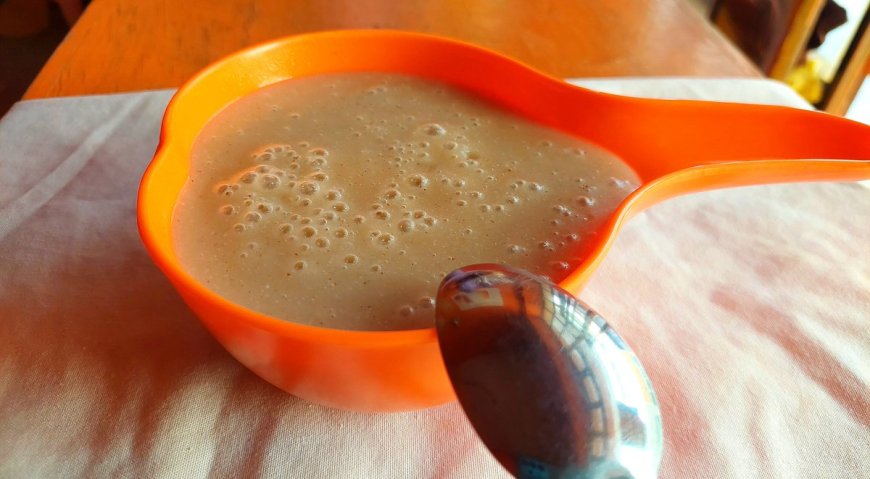Uji Power: Traditional Wisdom or Clever Marketing? An In-depth Look by a Dietitian.
Introduction
Uji Power has quickly become a household name in Kenya, sparking interest and debate far beyond its traditional roots. This fermented porridge, deeply embedded in East African culture, has been celebrated for generations, not only as a staple food but also for its nutritional benefits. Made from a variety of grains such as millet, sorghum, and maize, and sometimes enriched with additional ingredients like cassava, arrowroots, and groundnuts, uji is revered for its ability to provide sustenance and energy in a simple, affordable form. However, the emergence of Uji Power has introduced a modern twist to this age-old nourishment, claiming enhanced health benefits and catering to a growing health-conscious demographic.
The rise of Uji Power in Kenya is nothing short of remarkable. What was once a humble, traditional beverage consumed primarily for sustenance, has been transformed into a wellness product, celebrated for its supposed superior health benefits. This transformation raises the question: Is the popularity of Uji Power truly rooted in traditional wisdom and the genuine health benefits it provides, or is it riding the wave of clever marketing strategies? With packaging that appeals to contemporary tastes and advertising that promises not just nourishment but improved well-being, Uji Power sits at the intersection of cultural heritage and modern health trends.
This controversy is not just a matter of academic debate but touches on the daily lives of countless Kenyans who seek to balance traditional practices with the demands of modern life. As Uji Power continues to gain followers, the conversation around it grows more complex, weaving together threads of nutrition science, cultural identity, and consumer behavior. In this blog post, we will delve into these aspects, seeking to unravel the layers behind Uji Power's rise to prominence. Is it merely a case of old wine in a new bottle, or does Uji Power represent a meaningful evolution of traditional dietary wisdom? Join us as we explore the depths of this culinary phenomenon, its roots, its claims, and the marketing prowess that propels its journey across Kenyan homes and beyond.
The Roots of Uji Power
Historical and Cultural Significance of Uji
Uji, a traditional East African porridge, has been a cornerstone of the region's diet for centuries. This nutrient-dense, fermented beverage is deeply woven into the cultural fabric, serving not only as a daily sustenance but also playing a crucial role in various rituals and ceremonies. Traditionally, uji is consumed by all age groups, from infants to the elderly, highlighting its importance across different stages of life. In many communities, preparing and consuming uji is a communal activity, reflecting social cohesion and shared heritage. Its preparation techniques and consumption have been passed down through generations, symbolizing a living connection to ancestral knowledge and practices.
Traditional Ingredients and Their Health Benefits
Uji is traditionally made from a mixture of grains, including millet, sorghum, and maize. Each of these grains brings its own set of nutritional benefits to the table:
- Millet: Rich in vitamins, minerals, and fiber, millet supports digestive health and is gluten-free, making it a great option for those with gluten sensitivities.
- Sorghum: High in antioxidants, sorghum can help combat inflammation and manage cholesterol levels.
- Maize: Provides essential carbohydrates for energy, along with fiber, vitamins, and minerals.
These grains undergo fermentation, a process that enhances the bioavailability of nutrients, making them more accessible to the body. Fermentation also introduces beneficial probiotics, aiding in gut health and digestion.
Uji Power: Tradition vs. Modern Interpretation
Uji Power represents a modern reinterpretation of this traditional beverage, maintaining its core identity while adapting to contemporary health trends and nutritional science. While traditional uji focuses on the simplicity of fermented grains, Uji Power variants often incorporate additional ingredients such as arrowroots, cassava, and groundnuts, each contributing extra nutritional benefits:

- Arrowroots: Known for their easily digestible starch, making them gentle on the stomach.

- Cassava: A good source of vitamin C and carbohydrates.

- Groundnuts (Peanuts): Add protein and healthy fats, enhancing the porridge's energy-boosting capabilities.
Moreover, Uji Power may also fortify its formulations with additional vitamins and minerals to cater to specific nutritional needs or health claims, diverging from the traditional recipes that rely solely on the natural nutrition of their ingredients.
The alignment of Uji Power with traditional recipes lies in its preservation of uji's essence—a nutritious, energy-rich porridge. However, it diverges in its pursuit of targeted health benefits, modern packaging, and marketing strategies that position it as a superior health food. This evolution from a traditional staple to a contemporary wellness product reflects a blend of respect for cultural heritage with the innovations of modern nutrition science, aiming to meet the health-conscious consumer's demands without losing the essence of what makes uji a beloved part of East African culture.
Expert Insight: Dietitian Cate's Analysis of Uji Power
Cate Njoroge, a registered dietitian with over a decade of experience in nutritional science and a focus on East African diets, offers a nuanced perspective on Uji Power. According to Cate, the modern rendition of uji holds both promise and pitfalls when compared to its traditional counterpart.
On Nutritional Value and Ingredients
"Traditional uji and Uji Power share a common foundation: they are both nutrient-dense and can play a valuable role in a balanced diet. The fermentation process inherent in traditional uji making is a remarkable practice that increases the bioavailability of nutrients," Cate explains. She notes that this process also introduces probiotics into the diet, which are beneficial for gut health.
However, Cate points out that Uji Power takes a step further by incorporating additional ingredients like arrowroots, cassava, and groundnuts. "These additions can enhance the nutritional profile of Uji Power, offering a broader range of vitamins, minerals, and macronutrients such as protein and healthy fats. This makes Uji Power a more comprehensive meal solution, especially for individuals with higher nutritional needs."
On Health Claims and Marketing
While appreciating the nutritional enhancements of Uji Power, Cate also urges consumers to approach health claims with a critical eye. "It's important to recognize that while Uji Power is nutritious, no single food is a panacea. The health benefits of Uji Power, as with any food product, should be considered as part of an overall balanced diet."
Cate warns against the potential for marketing strategies to overstate the benefits of specific ingredients or formulations. "Marketing can sometimes blur the lines between traditional wisdom and scientific evidence. Consumers should look for Uji Power products that provide transparent nutritional information and evidence-based health claims."
On Tradition vs. Innovation
Cate appreciates the balance between tradition and innovation that Uji Power represents. "It's heartening to see a traditional food like uji being adapted and celebrated in modern diets. However, it's equally important to preserve the cultural heritage and nutritional wisdom that traditional uji embodies. Uji Power should be seen as an addition to, not a replacement for, the rich dietary traditions of East Africa."
Section 2: The Health Claims
Uji Power has been lauded for various health benefits, echoing the nutritional promises of its ingredients. Here, we dissect some of these claims against the backdrop of nutritional science and consult one of our expert dietitian, Cate Njoroge, for her expert analysis.
Health Claims Made by Proponents of Uji Power
- High Energy: Uji Power is often marketed as a high-energy food, ideal for starting the day or fueling physical activities.
- Nutritional Benefits: Claims include improved digestion, immune support, and enhanced nutrient intake.
- Weight Management: Some suggest that Uji Power can aid in weight management due to its high fiber content and ability to promote satiety.
- Blood Sugar Control: Ingredients like millet and sorghum in Uji Power are said to have a lower glycemic index, beneficial for blood sugar regulation.
Examining the Claims Through Nutritional Science
High Energy: The combination of complex carbohydrates from grains and simple sugars from additional ingredients like cassava provides a balanced energy release. This aligns with nutritional science, suggesting that Uji Power can indeed serve as a high-energy food.
Nutritional Benefits: The fermentation process in traditional uji enhances the bioavailability of nutrients, making it easier for the body to absorb them. Furthermore, the addition of nuts and legumes contributes protein and healthy fats, which are essential for immune function and overall health.
Weight Management: High-fiber foods like Uji Power can aid in weight management by promoting feelings of fullness and reducing overall calorie intake. However, this claim largely depends on portion sizes and the overall diet.
Blood Sugar Control: Grains with a lower glycemic index, such as millet and sorghum, are beneficial for blood sugar regulation. They prevent sharp spikes in blood sugar levels, supporting this claim.
Expert Opinion: Dietitian Cate's Analysis
Cate Njoroge offers her insight into these claims, emphasizing the importance of context in evaluating the benefits of Uji Power.
On High Energy and Nutritional Benefits: "Uji Power can indeed be a source of sustained energy, thanks to its complex carbs and protein. Its nutritional profile is impressive, especially with the added benefits of fermentation and diverse ingredients. However, it's crucial to remember that no single food can fulfill all nutritional needs. Diversity in the diet is key."
On Weight Management: "The fiber in Uji Power can certainly help with weight management by promoting satiety. Yet, consumers should be cautious about viewing any food as a magic bullet for weight loss. Healthy weight management involves a comprehensive lifestyle approach, including regular physical activity."
On Blood Sugar Control: "The ingredients in Uji Power that have a lower glycemic index are definitely a plus for managing blood sugar levels. This makes it a suitable option for people with diabetes or those trying to manage their blood sugar. However, individual responses can vary, and it's important to monitor blood sugar levels when incorporating new foods into your diet."
Cate's Conclusion: "While Uji Power is rooted in traditional nutrition and can offer significant health benefits, consumers should approach it as part of a balanced and diverse diet. It's also important to scrutinize product labels and marketing claims critically. Remember, traditional uji has nourished populations for generations, and Uji Power is simply a modern iteration with added benefits. As always, moderation is key."
Cate's insights underscore the importance of evaluating food claims with a critical and informed perspective, considering both the scientific evidence and traditional dietary wisdom.
Section 3: The Marketing Genius Behind Uji Power
Uji Power's success is not just a tale of a well-marketed product but a testament to the power of cultural authenticity and innovative presentation in capturing the consumer's heart. By serving this modern take on traditional uji in calabashes, Uji Power taps deeply into the roots of East African tradition, differentiating itself in a crowded market of health and wellness foods.
Branding Through Tradition

The decision to serve Uji Power in calabashes is a strategic branding move that emphasizes authenticity and tradition. Calabashes have a long history in many African cultures, used not only as containers but also as symbols of community, hospitality, and connection to nature. This method of serving Uji Power creates a unique, memorable experience that resonates with consumers seeking a touch of tradition in their daily lives. It stands as a homage to the past, all the while catering to modern health-conscious individuals.
Advertising Strategies
Uji Power's advertising strategies cleverly incorporate the imagery of calabashes, underscoring the product's roots in tradition and its commitment to cultural authenticity. Marketing materials highlight the communal and familial aspects of Uji Power consumption, showcasing groups of people coming together to share a meal served in calabashes. This not only promotes Uji Power as a nutritious option but also as a means to strengthen social bonds, appealing to consumers' emotional and cultural sentiments.
Role of Social Media and Testimonials
Social media plays a pivotal role in showcasing Uji Power's unique serving method. Through vivid photographs and engaging videos, the brand brings the traditional serving experience to the digital realm, captivating a broad audience. User-generated content often features customers sharing their own calabash-served Uji Power, fostering a sense of community and shared cultural identity. Testimonials on these platforms further reinforce the product's appeal, with many users highlighting the nostalgic connection to their heritage.
Celebrity Endorsements and Cultural Ambassadors
Rather than conventional celebrity endorsements, Uji Power benefits from the support of cultural ambassadors—individuals respected for their deep understanding and appreciation of African traditions. These influencers share their experiences with Uji Power, emphasizing its role in preserving cultural practices such as the communal sharing of meals from a calabash. This approach lends credibility and authenticity to the brand, appealing to consumers who value cultural heritage.
Marketing Focus: Tradition and Health Combined
Uji Power's marketing strategy is a masterful blend of cultural tradition and health-conscious modernity. By serving the beverage in calabashes, the brand not only honors traditional practices but also positions itself as a guardian of cultural heritage. This strategy, coupled with a focus on the nutritional benefits of Uji Power, attracts a diverse clientele, from those seeking a connection to their roots to health enthusiasts looking for wholesome, traditional foods.
In summary, Uji Power's marketing genius lies in its ability to tell a compelling story—one that speaks to the heart of its consumers by merging traditional wisdom with contemporary health trends. The choice to serve it in calabashes is a testament to the brand's commitment to authenticity, making Uji Power not just a beverage, but a cultural experience.
Section 4: Consumer Perception and Cultural Impact
Uji Power, traditionally served in calabashes, embodies a unique intersection of culture, health, and community in Kenya. By analyzing consumer feedback and exploring its broader cultural significance, we can gain insights into how this traditional beverage has adapted to contemporary life and its impact across generations.
Consumer Reviews and Feedback
Consumer reviews, gleaned from blogs, social media, and interviews, reveal a deep affection for Uji Power, not just as a nutritious drink but as a cultural staple. Many appreciate the convenience and health benefits it offers, especially in busy urban settings where traditional cooking practices might be time-consuming. The use of calabashes for serving is frequently mentioned with nostalgia and pride, underscoring a desire to maintain a tangible link to cultural heritage.
"A sip of Uji Power takes me back to my grandmother's kitchen," shares one consumer on a popular Kenyan food blog. "It's amazing how it blends tradition with the health consciousness of today."
Impact on Cultural Practices and Beliefs
Uji Power has significantly influenced contemporary Kenyan cultural practices and beliefs about health and nutrition. It has reignited interest in traditional dietary practices, showcasing the inherent wisdom of consuming whole, minimally processed foods. This revival comes at a time when global trends are increasingly leaning towards health and wellness, positioning Uji Power as both a cultural emblem and a modern health choice.
Moreover, Uji Power's popularity has spurred conversations about the importance of preserving culinary heritage while embracing modern nutritional science. It challenges the misconception that traditional foods are inherently less nutritious or inferior to Western dietary options, fostering a renewed appreciation for local ingredients and cooking methods.
Generational Differences in Perception and Consumption
The perception and consumption of Uji Power exhibit noticeable generational differences. Older generations often view Uji Power through the lens of nostalgia, associating it with memories of communal meals and traditional living. For them, Uji Power is more than a beverage; it's a cultural artifact that embodies the essence of Kenyan heritage.
Conversely, younger generations might encounter Uji Power in more urban, health-focused contexts. For these consumers, Uji Power represents a healthy, convenient option that aligns with their fast-paced lifestyles while offering a sense of connection to their roots. This generational shift has also influenced how Uji Power is marketed and consumed, with an emphasis on its health benefits appealing more to the younger demographic.
Yet, regardless of age, the consumption of Uji Power in calabashes serves as a unifying cultural practice, bridging the gap between tradition and modernity. This shared experience underscores the adaptability of cultural traditions, demonstrating their ability to evolve while maintaining their core identity.
Section 5: Criticisms and Controversies
Despite its popularity, Uji Power has not been immune to criticisms and controversies, with the most notable among them revolving around its purported benefits for enhancing male libido. This claim, while contributing to its fame, has also led to a range of humorous and sometimes uncomfortable discussions, particularly among men who have eagerly tested the claim with high hopes.
Enhanced Libido and Mukombero Addition
Some manufacturers and consumers claims to add mukombero (a root known locally for enhancing stamina in men) to their Uji Power mix, aiming to enhance its effects. The belief in Uji Power's capacity to enhance male libido, especially when augmented with mukombero, has been both a selling point and a source of controversy. While some attest to its efficacy, leading to increased popularity, others have shared humorous tales of disappointment, sparking debates about the validity of such claims. These narratives often reflect the societal pressures and expectations surrounding masculinity and sexual health, highlighting a nuanced aspect of Uji Power's cultural impact.
Addressing Criticisms Over Health Claims
In terms of health claims, Uji Power has been scrutinized for the broad range of benefits it purportedly offers. The addition of mukombero to the mix has further complicated these discussions, with some questioning the scientific basis of its supposed effects on stamina and libido. In response, some brands and proponents of Uji Power advocate for more research and transparency, providing consumers with detailed information about ingredients and potential health benefits. This approach aims to build trust and ensure that expectations are grounded in reality.
Pricing and Accessibility
Contrary to some concerns, Uji Power is generally not considered expensive, making it accessible to a broad segment of the population. This accessibility is crucial for maintaining Uji Power's status as a staple in Kenyan diets and ensuring that its health benefits are available to all, regardless of income level. Efforts to keep Uji Power affordable, coupled with its nutritional value and cultural significance, contribute to its continued popularity and positive perception among consumers.
Proactive Responses and Ethical Marketing
Manufacturers and advocates of Uji Power, aware of the controversies, have taken steps to address them proactively. This includes responsible marketing strategies that avoid overemphasizing unverified claims, especially regarding libido enhancement with mukombero. By focusing on the beverage's authentic, verifiable health benefits and maintaining its affordability, Uji Power remains a cherished part of Kenya's culinary heritage, enjoyed by many for its taste, nutritional value, and cultural significance.
Conclusion
Uji Power stands at the intersection of tradition and modernity, embodying the rich culinary heritage of Kenya while navigating the waters of contemporary health trends and marketing strategies. This exploration has delved into the roots of Uji Power, its health claims, marketing genius, and the dynamic between consumer perceptions and cultural impact. We've also addressed criticisms and controversies, notably around libido enhancement claims, with some variations including ingredients like mukombero for added effect.
Traditional Wisdom vs. Marketing Influence
The journey of Uji Power highlights a delicate balance between leveraging traditional wisdom for health benefits and the influence of modern marketing. While its nutritional value and cultural significance are rooted in centuries-old practices, the strategies used to promote it today reflect a modern understanding of consumer behavior and market demands. This duality poses both challenges and opportunities, emphasizing the need for integrity and authenticity in how such traditional products are presented to the public.
Preserving Cultural Heritage
The essence of Uji Power, beyond its physical consumption, is a testament to the enduring nature of Kenyan culture and its adaptability to contemporary life. As it transcends generations, the challenge remains to preserve its cultural heritage while embracing effective marketing tactics that resonate with today's consumers. This balance ensures that Uji Power retains its authenticity and continues to be celebrated for its genuine health benefits and cultural value.
The Future of Uji Power
Looking ahead, the future of Uji Power in Kenyan culture and beyond seems bright. Its ability to adapt, coupled with a growing global interest in traditional and natural health products, positions it well for continued relevance and popularity. As consumers become more health-conscious and interested in the stories behind their food, Uji Power's rich cultural background and nutritional profile make it an increasingly attractive option, not just in Kenya but worldwide.
Call to Action
We encourage you to share your experiences or opinions about Uji Power in the comments below. Have you noticed any health benefits? How do you reconcile the traditional aspects with modern marketing claims?
Additionally, we suggest critically evaluating health products and their marketing claims by researching their ingredients, understanding the cultural context, and looking for scientific evidence supporting their benefits. This approach ensures that you can enjoy traditional products like Uji Power while making informed decisions about your health and wellbeing.
Uji Power, with its blend of tradition and modern appeal, remains a vibrant symbol of Kenyan culture, inviting us all to explore the depth of its heritage and the potential it holds for nourishing future generations.










